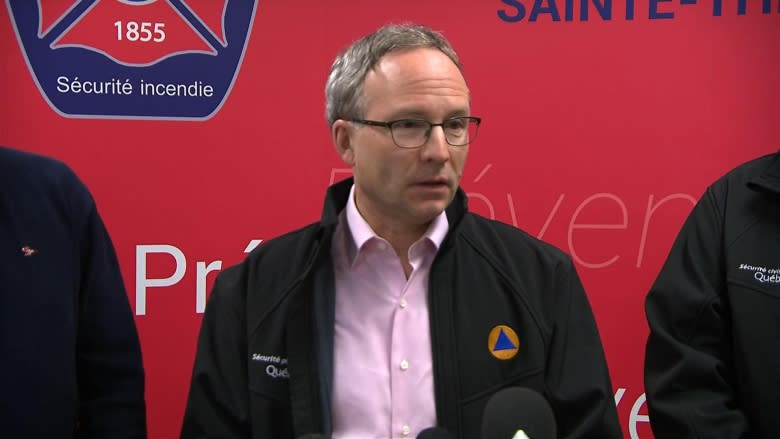Heavy rain leads to flooded streets, basements in Montreal area
When Isabelle Aumont returned to her Sainte-Thérèse home from work around 12:30 a.m., she settled in to watch some TV.
Soon after, she heard her sump pump working furiously, so she went to check it out. That's when she saw the water.
She heard her neighbours yelling outside and realized they were also being flooded.
"The firefighters told me I had 20 minutes to hurry up and remove everything I could from the basement," she said.
Aumont's is one of 30 homes that were evacuated overnight in Sainte-Thérèse due to rising water levels in Montreal-area waterways.
She rents out part of her basement and woke up the tenants to alert them to the flooding.
Aumont said the water moved so quickly that the difference was remarkable even after a half an hour. There's now 10 centimetres of water in her basement.
Hotspots throughout Lower Laurentians
Residents of the West Island and communities in the Lower Laurentians such as Blainville, Rosemère, Mascouche and Sainte-Thérèse, are dealing with flooding on their streets and, in some cases, their homes.
Low-lying areas near the Mille Îles River, in Laval and Terrebonne, and near the Lake of Two Mountains are also problem spots, said Chloé Alassimone, hydrologist at Hydro Météo, which monitors flooding for Quebec municipalities.
Maxime Gendron, the deputy director of the Blainville fire department, said they received many calls this morning as residents woke up and found water in their basements.
He said in his area, the hotspot is the Rivière aux Chiens, a small river that runs through both Blainville and neighbouring Rosemère.
Vanessa Thomas-Trudeau's father has lived in Blainville, close to the river, for 20 years, and when she came to check on him Friday, she said she has never seen the water levels so high.
"It's really shocking, we don't really know what to think," said Thomas-Trudeau. "I've never seen this in 20 years — it's quite big."
She said police and firefighters have been checking in with her family regularly. A bit of water got into the home, and while the pump is working well, she worries the rain will only continue.
"The worst is yet to come, I think," she said.
Municipal workers have also been laying down sandbags in the area since yesterday, Gendron said. A team of 15 firefighters is patrolling both cities, knocking on doors and helping residents.
The City of Laval is warning residents that they should expect flooding in neighbourhoods near the Rivière des Mille Îles and the Rivière des Prairies.
Patrick Ferland, Laval fire operations chief, said as of Friday morning only some streets in the western part of the city were flooding.
However, he said the situation is expected to worsen through the evening and the weekend.
The city is offering free sand and bags at fire stations 3, 4, 5, 6, 7 and 8 so residents can build dikes around their homes.
Quebec ready to act
Quebec Public Security Minister Martin Coiteux said the province is closely monitoring the water levels in municipalities across Quebec.
"We're ready to act if necessary," said Coiteux during a news conference in Sainte-Thérèse this afternoon.
An information session is being held in Sainte-Thérèse on Saturday to let residents know what kind of financial aid they are entitled to if their homes are damaged from flooding and heavy rain.
"I would like to let affected residents know that the government of Quebec has programs that exist to help them," said Coiteux.
Melting snow, ice to contribute to rising water
Water levels are also expected to gradually rise in the Châteauguay River and may lead to flooding in low-lying areas near Huntingdon and Ormstown, Alassimone said.
Melting snow and ice will have an impact on water levels in the coming days. But Alassimone added that since there is less snow in areas on the South Shore and in the Richelieu Valley, waterways in those places won't rise at the same rate as ones to the north and west of Montreal.
The Montreal region got about 36 millimetres of rain Thursday, and southern Quebec was under a rainfall warning for much of the week.
According to Environment Canada meteorologist Serge Mainville, the main precipitation band has moved out of the area.
The Montreal area got about 10 millimetres of rain throughout Friday. As the temperature drops, the rain will turn to snow, but it won't stick around, he said.
The clouds are supposed to clear out over the weekend.




